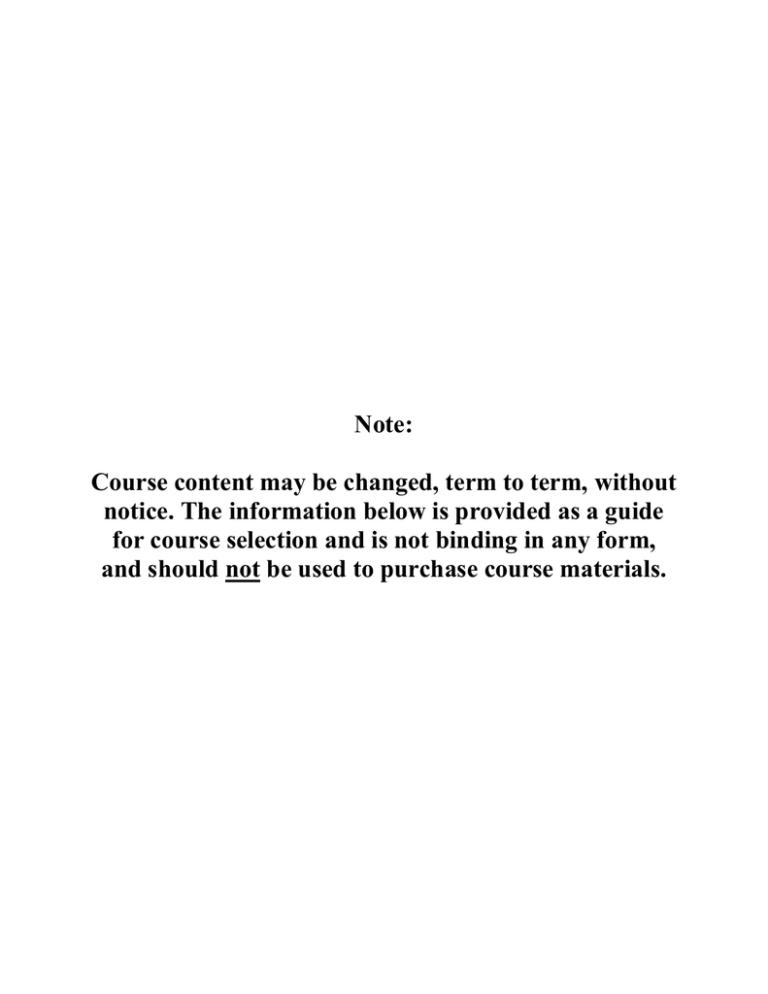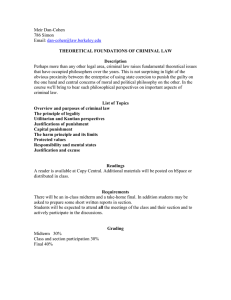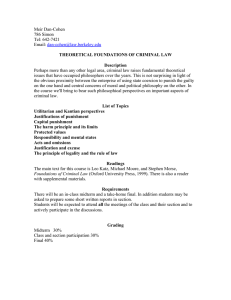Note: Course content may be changed, term to term, without
advertisement

Note: Course content may be changed, term to term, without notice. The information below is provided as a guide for course selection and is not binding in any form, and should not be used to purchase course materials. CJUS 530 Course Syllabus COURSE SYLLABUS CJUS 530 HUMAN RESOURCE MANAGEMENT IN CRIMINAL JUSTICE ORGANIZATIONS COURSE DESCRIPTION This class will emphasize applying the theoretical knowledge discussed in class lectures to “real world” situations and events important to human resources management in criminal justice. The student will be expected to demonstrate their knowledge of human resources management in a criminal justice setting through various reading and written exercises. General objectives for students are to learn and be able to apply general management principles and techniques in a public agency office setting. The role of personnel manager in a criminal justice setting is stressed throughout the course, to define and clarify responsibilities, areas of authority, decisionmaking, and technical knowledge of services, systems, and procedure. While the subject primarily targets personnel managers, all supervisors and managers benefit from effective personnel management skills, knowledge of services, systems, and procedures. While the subject primarily targets personnel, managers, all supervisors and managers benefit from effective personnel management skills, knowledge and abilities. RATIONALE At the end of this course, the student will be able to motivate the workforce legally, ethically, and effectively in a criminal justice organization. The student will demonstrate the ability to explain institutional and legal environment of criminal justice organizations and assess practical situations in administrative issues and take principled positions. The student will identify the legal implications of diversity in criminal justice organizations and understand the composition and demographics of a changing society and workforce. The student will design and use hiring and performance measures in criminal justice administration and apply workable theories that can inform leadership and management in criminal justice organizations. Lastly, the student will explain the external and institutional politics of decision-making in criminal justice organizations and apply systematic research processes to novel problems and produce solutions in a written format. I. PREREQUISITE For information regarding prerequisites for this course, please refer to the Academic Course Catalog. II. REQUIRED RESOURCE PURCHASE Click on the following link to view the required resource(s) for the term in which you are registered: http://bookstore.mbsdirect.net/liberty.htm III. ADDITIONAL MATERIALS FOR LEARNING A. Computer with basic audio/video output equipment B. Internet access (broadband recommended) Page 1 of 4 CJUS 530 Course Syllabus C. IV. Microsoft Office MEASURABLE LEARNING OUTCOMES Upon successful completion of this course, the student will be able to: V. A. Apply concepts learned in class to factual situations. B. Discuss contemporary issues in the personnel field. C. Analyze the major functions of criminal justice management. D. Analyze the steps of the selection process in the criminal justice context. E. List the steps necessary to implement human resource planning in the criminal justice context. F. Distinguish between policies and rules and formulate policy statements. COURSE REQUIREMENTS AND ASSIGNMENTS A. Textbook readings and lecture presentations B. Course Requirements Checklist After reading the Course Syllabus and Student Expectations, the student will complete the related checklist found in Module/Week 1. C. Discussion Board Forums (4) Discussion boards are collaborative learning experiences. There are 4 discussion questions along with reading assignments for each Discussion Board Forum. The student will complete the assigned readings and post a thread of at least 350 words, including at least 2 citations in current APA format from at least 2 different resources. Then, the student will post replies of at least 175 words (including at least 1 in-text citation each) to 2 classmate’s threads. D. Case Study Critiques (2) The student will be required to write a critique of 2 case studies in the course. Each case study critique must be between 3–5 pages (not counting title, abstract, or reference pages) in current APA format and must discuss the major facts of the case. The student must tell whether or not he/she believes the right decision(s) was/were made and why (see additional hints on electronic instructions). E. Quizzes (2) Each quiz will cover the Reading & Study material for the module/week in which it is assigned. Each quiz will be open-book/open-notes, contain 15 multiplechoice or true/false questions and 1 essay question, and have a 1-hour and 30minute time limit. F. Midterm and Final Essays (2) Both the Midterm and Final Essays will require the student to respond to 1 broadbased question about criminal justice administration. In essence, the student will be asked to demonstrate critical thinking about controversial issues in criminal Page 2 of 4 CJUS 530 Course Syllabus justice administration and to take a position on which course of action would be the best approach for criminal justice administrators. To adequately respond to the question, the student will need to write 3 or more pages (not counting title, abstract, or reference pages) in current APA format (see additional hints on electronic instructions). VI. COURSE GRADING AND POLICIES A. Points Course Requirements Checklist Discussion Board Forums (4 at 75 pts ea) Case Study Critiques (2 at 100 pts ea) Quizzes (2 at 100 pts ea) Midterm and Final Essays (2 at 150 pts ea) Total B. 10 300 200 200 300 1010 Scale A = 940–1010 A- = 920–939 B+ = 900–919 B = 860–899 B- = 840–859 C+ = 820–839 C = 780–819 C- = 760–779 D+ = 740–759 D=700–739 D- =680–699 F = 0–679 C. Late Assignment Policy If the student is unable to complete an assignment on time, then he or she must contact the instructor immediately by email. Assignments that are submitted after the due date without prior approval from the instructor will receive the following deductions: 1. Late assignments submitted within one week of the due date will receive a 10% deduction. 2. Assignments submitted more than one week late will receive a 20% deduction. 3. Assignments submitted two weeks late or after the final date of the course will not be accepted. 4. Late Discussion Board threads or replies will not be accepted. Special circumstances (e.g. death in the family, personal health issues) will be reviewed by the instructor on a case-by-case basis. D. CJUS Policy The nature of the criminal justice community demands that persons involved be of a high level of integrity, and education is not merely academic in nature, but is holistic. Students enrolled in CJUS courses will be held to a high standard. Selfcontrol is imperative for CJUS practitioners. If not “merely” to honor Christ, your family, and this academic institution, on a purely pragmatic level, in anticipation of future employability in the career field of your choice, conduct yourselves so as not to place yourselves in difficult and embarrassing situations. Page 3 of 4 CJUS 530 Course Syllabus E. Disability Assistance Students with a documented disability may contact Liberty University Online’s Office of Disability Academic Support (ODAS) at LUOODAS@liberty.edu to make arrangements for academic accommodations. Further information can be found at www.liberty.edu/disabilitysupport. Page 4 of 4 COUR ### Course Schedule COURSE SCHEDULE CJUS 530 Textbooks: More et al., Organizational Behavior and Management in Law Enforcement (2012). Riccucci, Public Personnel Management (2012). MODULE/ WEEK READING & STUDY 1 More et al: chs. 1–3 Riccucci: chs. 1–3 3 presentations Course Requirements Checklist Class Introductions DB Forum 1 10 0 75 2 More et al: chs. 4–6 Riccucci: chs. 4–6 2 presentations Quiz 1 100 3 More et al: chs. 7–8 Riccucci: chs. 7–8 3 presentations 1 website DB Forum 2 Case Study Critique 1 75 100 4 More et al: chs. 9–10 Riccucci: chs. 9–10 2 presentations 1 article Midterm Essay 150 5 More et al: chs. 11–12 Riccucci: chs. 11–13 3 presentations 1 article DB Forum 3 Case Study Critique 2 75 100 6 More et al: chs. 13–14 Riccucci: ch. 14 2 presentations Quiz 2 100 7 Riccucci: chs. 15–16 2 presentations DB Forum 4 75 8 More et al: ch. 15 Riccucci: ch. 17 2 presentations 1 website Final Essay 150 TOTAL 1010 ASSIGNMENTS POINTS DB = Discussion Board NOTE: Each course module/week begins on Monday morning at 12:00 a.m. (ET) and ends on Sunday night at 11:59 p.m. (ET). The final module/week ends at 11:59 p.m. (ET) on Friday.



